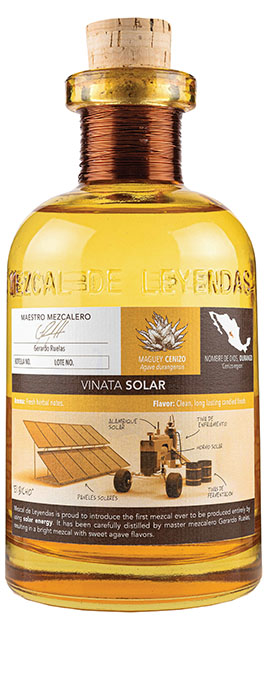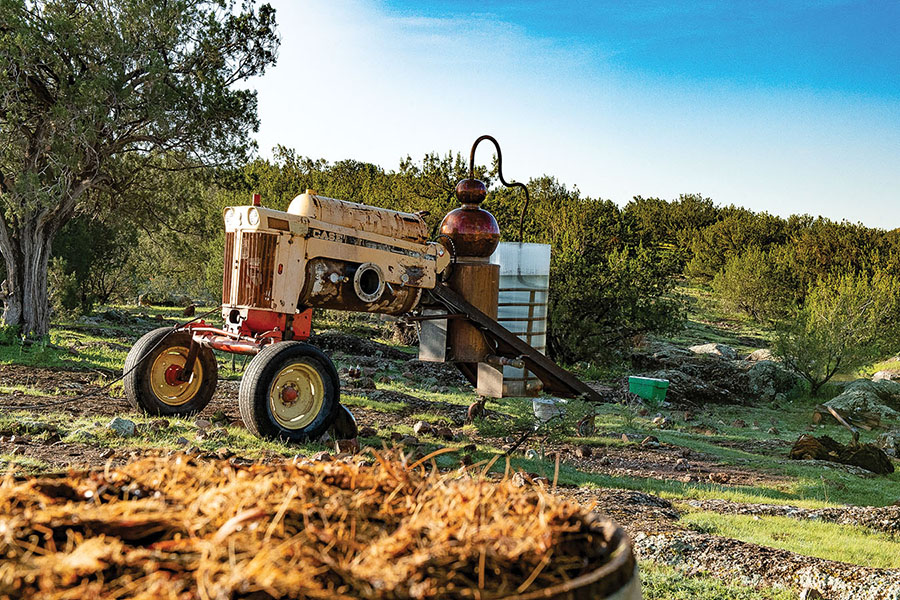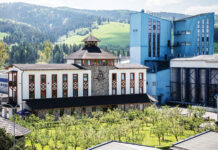Mezcal has always had a problem: Where it’s distilled is frequently far from where the agaves grow. Harvesting and transporting those heavy plants from remote and often difficult-to-reach areas can take an enormous amount of time and effort.
Mezcal de Leyendas has a new idea for solving the issue of getting agaves to the distillery: bring the distillery to the agaves. This new project, aptly named Vinata Solar (“solar distillery” in Spanish), is a completely solar-powered distillery mounted on a tractor in Durango, Mexico. Today this proof-of-concept project produces a small amount of mezcal, but it has the potential to change how mezcal is made in rural Mexico.
Why Put a Distillery On a Tractor?
Vinata Solar was inspired by a combination of mezcal’s exigencies and an obsession with Cognac. Cesar Gonzalez, one of Mezcal de Leyendas’ partners, was inspired by the tradition of horse-pulled Cognac distilleries that went from farm to farm across southwest France turning wine into eau de vie. Because of the remoteness of agave sources and undependable local infrastructure, it is common in the mezcal world to use donkeys to haul agaves from where they are harvested to the distillery.
 Danny Mena, a co-founder of Mezcal de Leyendas, has long experience with the difficulties of sourcing rare agave because the brand bottles small batches from all over Mexico. One Leyendas release, distilled from an incredibly rare agave called Agave montana, highlighted the need for the Vinata Solar. Agave montana are found in such a remote area of the Mexican state of Tamaulipas that they had to custom-build a distillery in order to make that mezcal. The experience made Mena think it might “be cool to create a distillery that we could take to the mountains of Tamaulipas or wherever.”
Danny Mena, a co-founder of Mezcal de Leyendas, has long experience with the difficulties of sourcing rare agave because the brand bottles small batches from all over Mexico. One Leyendas release, distilled from an incredibly rare agave called Agave montana, highlighted the need for the Vinata Solar. Agave montana are found in such a remote area of the Mexican state of Tamaulipas that they had to custom-build a distillery in order to make that mezcal. The experience made Mena think it might “be cool to create a distillery that we could take to the mountains of Tamaulipas or wherever.”
Gonzalez proposed the idea of a mobile distillery to students at the Autonomous University of Chihuahua, and they were off and running. Initial batches were of wildly variable quality. One batch was almost all furfural. Others were full of heads or full of tails, and one yielded only a single liter. But a positive engineering mindset and three years of iteration brought them to the current setup, which produces 180 bottles a month.
How the Vinata Solar Works
Gonzalez and the students came up with a simple upcycled design: They stripped down an old tractor nicknamed El Bicho (The Bug) and inserted a steel-jacketed steamer in the belly and a copper alembic still on its back. Agave is roasted in the oven, which is basically a solar-powered mash tun, and then run through a mechanical shredder. The shredded agave is fermented in traditional open-air wooden vats, and then distilled in the copper alembic, which also runs off solar panels. The whole project is carbon neutral because the system feeds electricity from the panels back into the local grid when it’s not actively distilling.
Originally Mena was “a bit hesitant” about the process because he was worried that it would be “too similar to a tequila” and not highlight the amazing flavors of the local Cenizo agaves. He was surprised by the final result because it was so distinct from the steamed roasting profiles present in many tequilas. “This is really cool, man,” says Mena. “This new one comes in at 50% [ABV] and has a wonderful mouthfeel that is super unctuous and has some smoke.”
 What’s Next for Vinata Solar
What’s Next for Vinata Solar
Vinata Solar’s utility as a truly mobile distillery is hampered by its design trade-offs: All of the tractor’s engine and active components were stripped out for the distilling equipment, so the device must be moved by truck. But Mena and his collaborators are scheming on how to deploy it somewhere else and are offering up the blueprints so that anyone else can build or adapt it to their needs. Given the paucity of resources in rural Mexico, this sort of project could provide fantastic inspiration.
While Mena doesn’t know exactly where this will lead, he is focused on trying to adapt it to the world of mezcal. Traditionally mezcal is made by roasting agaves underground where they come into direct contact with smoke, which provides flavors and aromas that are critical to its identity. “I love the deep caramelization that underground roasting brings,” Mena says. But traditional mezcal makers also use wood fires to power their stills. That is a step where the wood doesn’t add any flavor to the mezcal, but does generate pollution. Eliminating that step has the potential to benefit the health of our planet and mezcal distillers — a true win-win.








